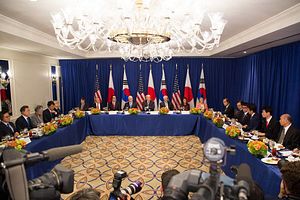Over the weekend, news emerged of the United States looking to extract greater financial support for its basing requirements from hosts South Korea and Japan. This wasn’t entirely unexpected. The Trump administration has been relatively successful in pushing NATO counterparts to increase their own defense spending after loudly accusing them of freeloading. The administration had also already recently renegotiated South Korea’s financial commitments to American basing, convincing Seoul to pay an extra 8 percent.
What’s different this time are the exorbitant demands — roughly 500 percent increases in payment from both countries resulting in double the real cost. Should negotiations fail, the Trump administration will be in a difficult spot of either being forced to prove its commitment to the security of its regional allies or taking the radical step of removing troops. The latter could prove near fatal to U.S. security commitments and threaten an already fragile U.S. security alliance system.
Whether deliberate or in error, the public nature of these negotiations has almost certainly doomed them. Left to diplomats, these negotiations — occurring every five years — typically go smoothly. Yet, when these kinds of talks move out into the public sphere, pressure from the public builds on the host government to resist capitulation. Basing, especially in Japan, hasn’t always been popular so little public support is expected for even modest increases. In South Korea, polling puts opposition to increased basing support at 96 percent.
Just the negotiations risk anti-Americanism and loss of support for the U.S.-led alliance in both host countries. This could lead to reduced access to territorial waters for patrols or intelligence gathering as well as a continued fracturing of an already fragile Korean-Japanese relationship. Reduced military-to-military interactions and interoperability will have severe detrimental effects on cooperative response abilities between the United States and both countries should regional tensions flare up.
If the United States faces rejection, it will be left with two unfavorable options: quietly accept defeat and try to more discreetly negotiate a reasonable settlement or make good on its word and pull troops from both countries. This latter option may be what U.S. President Donald Trump wants according to Scott Snyder, director of the U.S.-Korea policy program at the Council on Foreign Relations, as reported by CNN. The president has been insistent in his theory that American allies routinely take advantage of Washington, therefore removing troops would be punishment for insufficient reparations.
Pulling American troops from both countries would be an unprecedented move, clearly signaling to both countries that their security and status as allies is less important than a few extra dollar signs. Both Japan and South Korea would be left with the impression that they need to counter China’s military build-up and North Korea’s renewed threats without the assistance of the United States, even if there’s strategic value for the United States in countering these threats.
The United States is afforded significant latitude in both countries in order to deter North Korean and Chinese threats, and troop basing is part of that latitude. Antagonistically removing those troops, who also provide assurances for Seoul and Tokyo, risks other U.S. deployments in the region. South Korea could threaten the removal of the T.H.A.A.D. (Terminal High Altitude Air Defense) anti-ballistic missile defense system and Japan could turn on its intention to purchase and deploy the same system. U.S. hopes for future intermediate range ground based missile deployments to either country, after the death of the INF (Intermediate Range Nuclear Forces) Treaty, would also be dead on arrival.
The greatest risk, though perhaps the least likely, would be either country renewing past pursuits of nuclear weapons. Current American basing and military assistance to Seoul takes precedent from former U.S. President Gerald Ford’s efforts to halt a South Korean nuclear weapons program. North Korea didn’t have the bomb then, so if South Korea believes there isn’t an effective U.S. deterrent in place then it might develop one on its own. Similarly, Japan has several times in the last 30 years considered pursuing its own nuclear weapons on the basis that the American extended deterrent was no longer viable. Should either pursue the bomb, both countries would be violating their adherence to the Nuclear Non-Proliferation Treaty. Yet when the Trump administration ignores North Korean missile tests that violate UN Security Council resolutions they might see no other way.
Alliances exist to mitigate mutual security concerns and more efficiently share the burden of countering and reducing threats. Forced to meet these threats on their own, South Korea and Japan could feel compelled to take radical steps for their own security, which could further destabilize the region. This alone should be reason enough for the United States to reconsider its stance.
Jonathan Stutte is a staff writer for Charged Affairs, the Young Professionals in Foreign Policy’s foreign policy journal.













